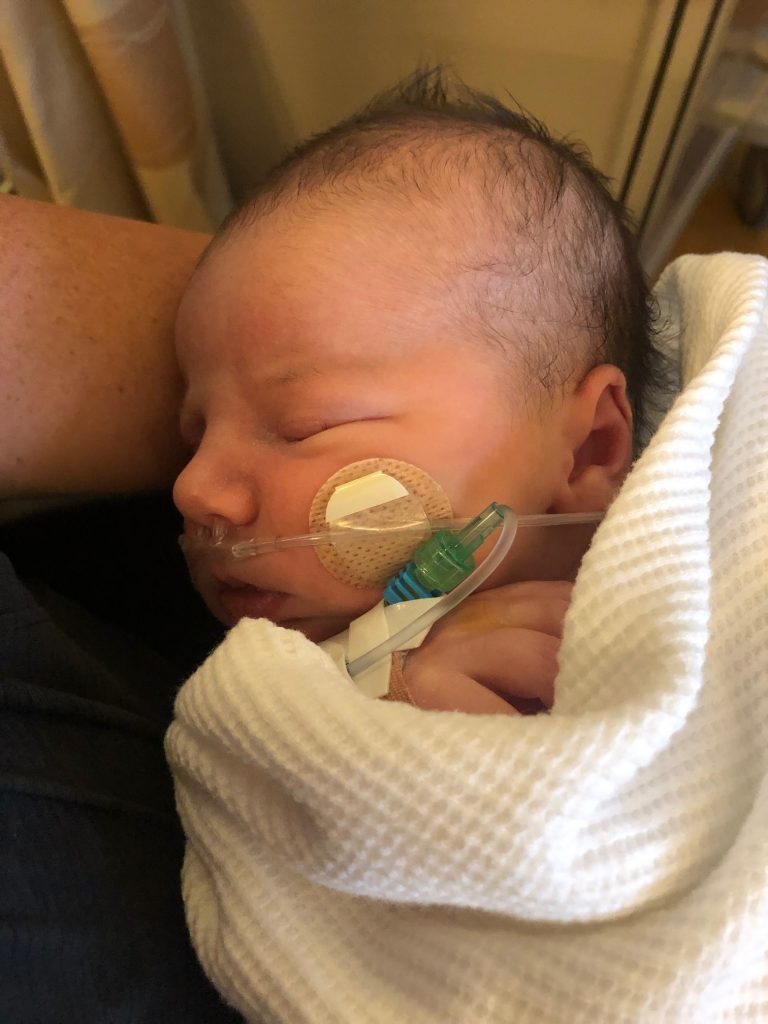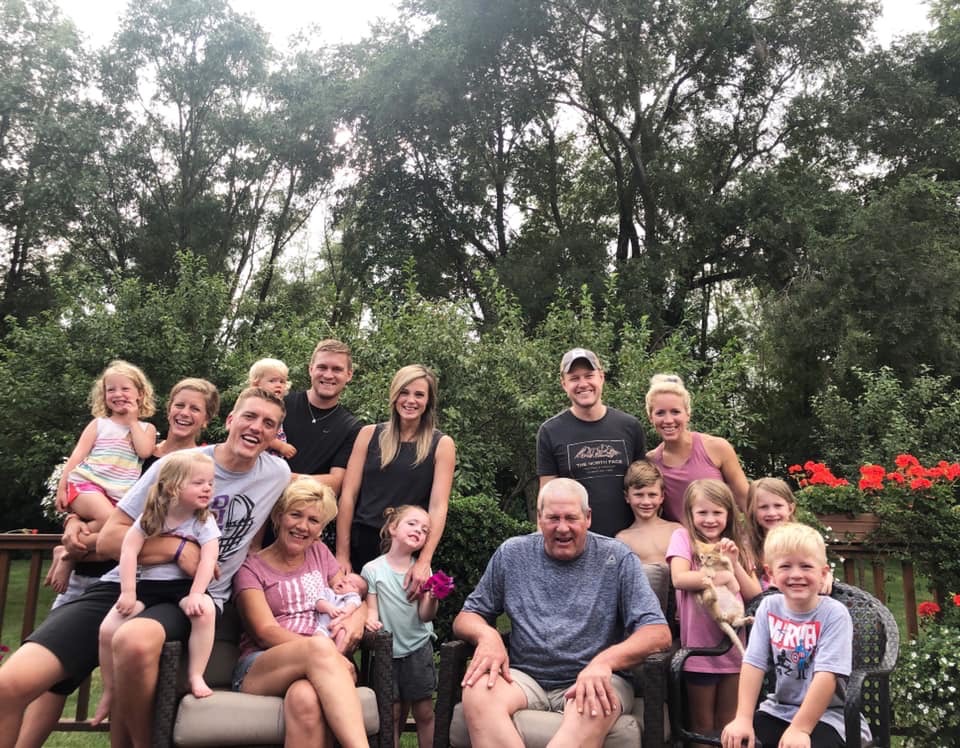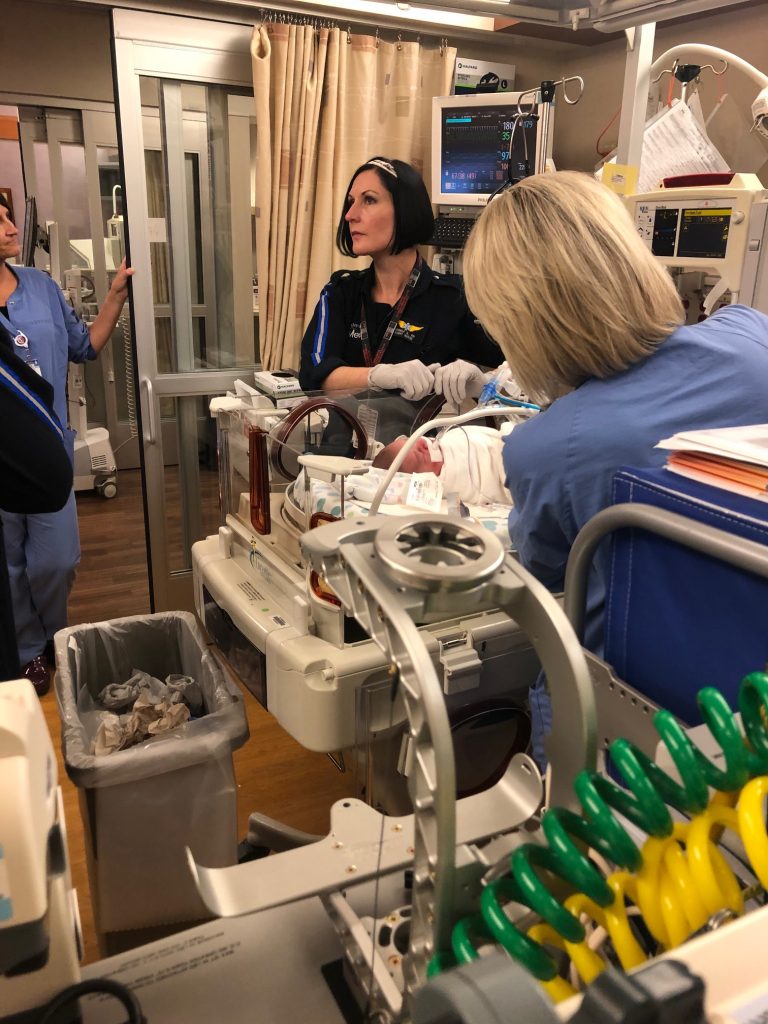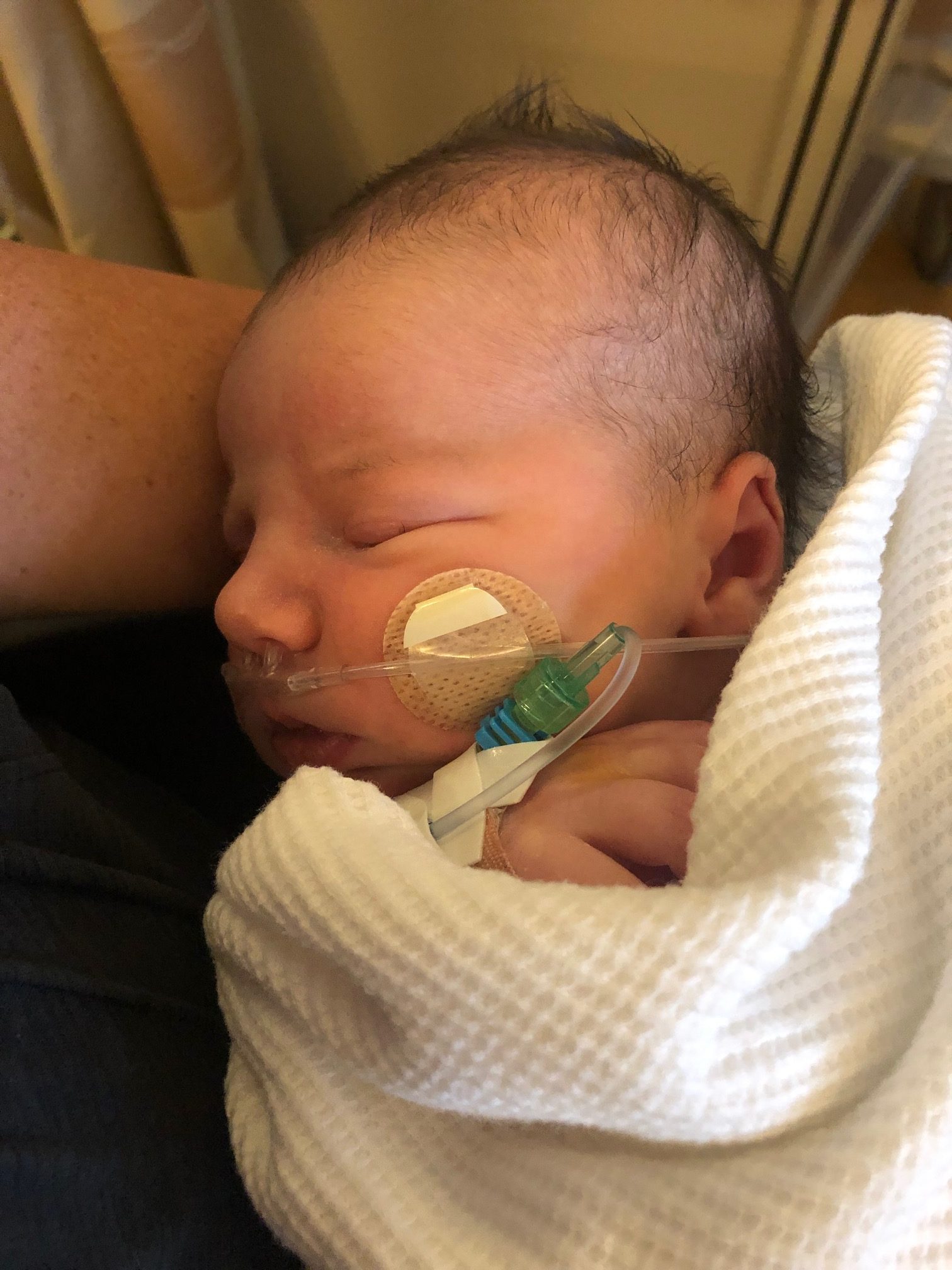
First, I want to say that I’m writing this mainly for myself. As I’ve navigated the last two months post heart surgery and all that transpired with Truett, I’ve been blessed (or sometimes I think cursed) with a crystal clear memory of all that transpired. And before those memories fade, I want to make sure I have documented this tender, terrifying and miraculous time in our lives and in Truett’s life. Some may find this helpful, others may find it entirely irrelevant. Be forewarned that what is to come is probably going to be one of the longest posts ever to grace Espresso and Cream.
Truett was born on Friday, August 2nd at a healthy, chunky 9 lbs. 1 oz. He had Apgar scores of 8 and 9 and in all regards checked out perfectly healthy. We were discharged two days later and started our life as a family of five. Our first week with Truett at home was uneventful and filled with the typical new baby things – finding a new family rhythm, working on feeding, trying to get a few minutes of shut-eye. You know the drill.
Truett was a champ eater from the moment he entered the world, and he continued to eat and gain weight well during the first week at home. The following Friday, August 9th we had Truett’s one week appointment. He had regained his birth weight and then some, and checked out well in all regards. Joe’s side of the family came to visit us that weekend and we spent our time together enjoying introducing Truett to his cousins and aunts and uncles. That Saturday night I remember particularly well as we spent it at home, snuggled on the couch, soaking up all the new baby goodness late into the night.

Sunday morning was our first Sunday at home and after a full weekend spent with family, Joe and I were exhausted and debated keeping our family home from church. Ultimately, we decided to go and I’m so very thankful we did. As most of you with multiple kiddos know, subsequent babies don’t get as much individual attention as the first baby does. While we were in church, Collins was having a hard time sitting still, so we took her to nursery and Ainsley stayed in nursery with Collins for moral support. With our two big kiddos in nursery, it allowed us to focus our attention on Truett.
Before we had left for church, Joe had made a comment about Truett’s breathing. He said, “Is his breathing always this rapid?” We both dismissed it as normal baby breathing variances. While he was sitting in his car seat sleeping, I noticed that his breathing was, again, very rapid. I took him out of his car seat and let him sleep in my lap. The vision of him sitting in my lap is still so clear in my mind. As he laid in my lap sleeping, I continued to count his breaths per minute – they were consistently rapid. I pulled out my phone and googled “normal baby breaths per minute” and was informed by Dr. Google that it’s typical to see a range of 30 to 60 breaths per minute. I pulled out my stopwatch app on the phone and counted: 80 breaths per minute. I gave it a few more minutes and counted again: 75. I counted again: 85. At this point, alarms started going off in my head. I continued to watch him, and whisper to Joe that I thought something was wrong. He seemed otherwise fine, but his breathing concerned me.
After the service wrapped up, I told Joe I thought we might need to take him into the ER. We debated if it was necessary, and settled on calling into the nurse station. The nurse on call told me that 80 breaths per minute did, indeed, seem on the high side and was probably worth taking a look at. I loaded Truett up in his car seat, I was still dressed in my church clothes, and told Joe I would be back soon. Honest to goodness, I thought they would check him out, tell me everything was fine, and we would be home in an hour or two.
When we got to the ER they took his temp (normal) and hooked him up to check his pulse ox. His levels were a little on the low side, though still in the 90’s. They also checked his respiratory rate, which was also on the high side as I had noted. He wasn’t fussy and seemed otherwise fine. They started to run some blood work to check for viral and bacterial infections, and sent us to X-ray to check his lungs for any type of pneumonia or other issues that might be impacting his breathing.
While we waited for his results to come back, the doctor on call said that they would be moving us to a room to keep us overnight for observation. He didn’t seem overly concerned but said since he was a young baby, and they didn’t know what was going on, it was probably best to keep him for observation.
At this point I called Joe to tell him I would need to pack and bag to stay overnight at the hospital. Ainsley was with my mom, so Joe called his parents to come take Collins so Joe could be at the hospital with me. When Joe arrived we were already in our room for our overnight stay. He took over with Truett so I could run home and pack a bag. I zipped home and shoved a bunch of random items into a bag. Thankfully the nurse had told me to pack my breast pump – something I assumed was totally unnecessary at the time – but was a saving grace looking back. I made a smoothie because I was famished (#breastfeeding) and sped back to the hospital as quickly as I could. When I got back to the room they had moved Truett to supplemental oxygen with a nasal canula. For some reason seeing him hooked up to oxygen stopped me in my tracks and sent off alarms in my head.
The respiratory therapist told us that they were going to keep him on oxygen to keep his levels where they wanted them. He was doing well at that point on a low dose of oxygen and continued to seem content and peaceful otherwise. When the doctor on call returned to the room he said that the X-ray hadn’t revealed anything unusual and they were still waiting on some of the blood results. At this point, he had no answers as to why Truett was breathing rapidly or having issues keeping his oxygen levels up.
Since we live in a small town with more limited medical resources for small babies, he said we could stay for observation or we could opt to head to Sioux Falls – about an hour and a half away where they have a NICU and more advanced medical resources. I asked what he would recommend, and he said it was up to us what we decided to do. We opted to have Truett sent to Sioux Falls after being told that the extent of what they could do at our hospital was to put him on the oxygen they already had him on. I felt better playing it safe, even though it might not be necessary.
After we decided to have him transferred, things started to move very quickly. We were initially told he would be transferred via ambulance, but after they called up to Sioux Falls they opted to have him transferred via helicopter so Sioux Falls could provide their own crew of medical professionals with additional medical resources. At this point, things started to get scary to me. As we waited for the crew from Sioux Falls to arrive, I held my baby and just prayed over his little body. I remember looking at him and the thing that echoed through my mind was, “He is yours, God, not mine. I’m just the lucky one who gets to care for him here on earth.”
When the crew from Sioux Falls arrived I was greeted by two women – the nurse and the nurse practitioner – whose faces literally looked like angels to me. They were both tall (for some reason it stood out to me) and they had the kindest faces. Their demeanor and reassurances put me at ease – or as much at ease as I could be in that moment knowing I would be putting my baby into their care on a helicopter and would not be able to go with him. Things started moving really fast once the crew arrived. They got an IV line in Truett, and began taking blood to run more tests. At this point Truett was very angry about getting his blood drawn and I remember them telling me it was a good sign he was angry as it meant he had a lot of fight in him. They told me they would be running a bunch of tests – that it could be anything from a viral or bacterial infection to a metabolic disorder to a heart issue.
A heart issue. It can’t be a heart issue. There can’t be anything wrong with this heart. And yet I knew, in my gut, that it was a heart issue. Something deep inside – although in denial at the time – knew that was what was wrong.
The crew assured me they would take the best care of Truett possible and would call me as soon as they arrived in Sioux Falls. We would follow behind in our car. Was it scary to send him off with them? Yes. But at the time it wasn’t as scary as it could have been because we didn’t really know what was wrong.
As Joe and I drove together (with our bags packed meagerly for one night at our local hospital) we both tried to put on brave faces but took turns crying as we processed and prayed and updated friends and family on what was going on with Truett. We got a phone call along the way from the crew letting us know Truett did well with the transfer and was getting settled into his room in the NICU.
When we arrived at the NICU we were immediately greeted by the transfer crew who was updating the NICU staff on Truett’s case. We also talked with the neonatologist on duty who let us know that they were waiting to get the blood results back which would rule out bacterial and viral infections as well as metabolic disorders. He said the cardiology team would also come up and run an echo on Truett to look at his heart. I remember him saying, “Based on what I’m seeing, it doesn’t look like a heart issue, it doesn’t smell like a heart issue, but we need to run the echo to be safe.”
I still remember the face of the echo tech, Sam, as I spent a good deal of time studying her movements and watching her face while she performed Truett’s echo. In fact, I remembered her face so well that I remembered her when she did Truett’s follow-up echo nearly two months later. After the echo was performed the neonatologist returned to the room to tell us that Truett had a serious congenital heart defect called coarctation of the aorta.
While many of the moments of Truett’s CHD story are very clear to me, the next few hours were a bit of a blur. Words like “life threatening condition” were tossed around and my brain struggled to keep pace with what was happening. Truett went from being hooked up to a couple monitors while I held him and a small canula of oxygen to many more monitors and medications. I remember putting him on the warming bed in the NICU, not realizing that it would be the last time I actually held my baby for nearly five days.
I do remember looking at Joe as soon as we got the news about Truett’s coarctation and hearing Joe say, “If it was going to happen to anyone, it would be us. And we can handle this.” And while my first reaction was certainly fear when faced with my son’s diagnosis, I vividly remember feeling God’s gracious hand over the situation, and nearly instantly being brought to tears thinking of how gracious God was to offer us the gift of catching Truett’s condition when we did.
We waited some amount of time (time was a blur that day/night) for the cardiologist to arrive to talk through Truett’s case in more detail and make a plan for surgery. Sioux Falls didn’t have the capability to perform the surgery, so we knew we would need to be transported elsewhere to have the surgery performed.

When the cardiologist arrived, she explained that when babies are in the womb, they have something called a PDA which is a temporary structure that exists for babies in the womb. Since babies don’t use their lungs in the womb, there is no need for the heart to pump blood to the lungs, and the PDA allows the heart to bypass the lungs. When a baby is a few days old, the PDA closes/deteriorates and the aorta begins to function to bring blood to the kidneys, liver and lower extremities. A hormone called prostaglandin, which is provided by the mother in the womb keeps the PDA open. Because Truett’s coarctation and narrowing of the aortic arch so severe, when the PDA closed he began to deteriorate rapidly. Which is why he appeared to be so well initially and then declined so rapidly.
What was unusual in our situation was that Truett’s severe coarctation presented itself very late – at nine days old. When they started the prostaglandin to try and re-open the PDA, it had already started to deteriorate and the prostaglandin was only marginally successful at opening back up the PDA to maintain blood flow. When they realized that the prostaglandin wasn’t working as well as they hoped, it went from “we will likely transport you for surgery within the next day or two” to “we are going to get you out tonight.”
One huge grace in all of this was the fact that our early detection of Truett’s rapid breathing and the medical team’s quick action to catch the coarctation meant that his heart didn’t have to struggle to pump blood very long. We were so thankful that his heart showed no signs of damage because it was caught so early!
We were given a couple options of where to send Truett for surgery, but it was clear that our cardiologist thought most highly of the team at the University of Michigan in Ann Arbor. And so, hearing that, we made the decision to head to Ann Arbor.
Part 2 to come.

